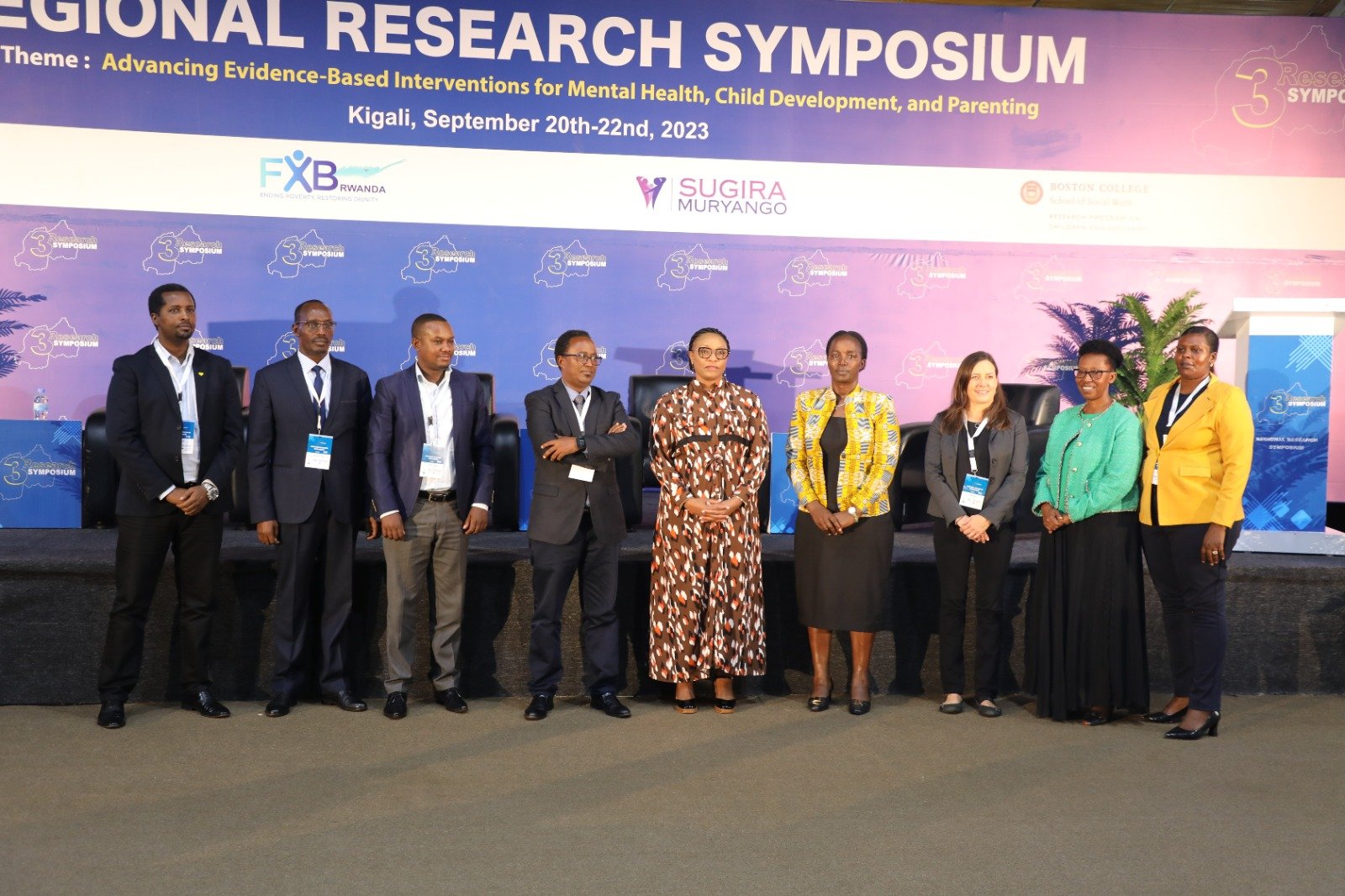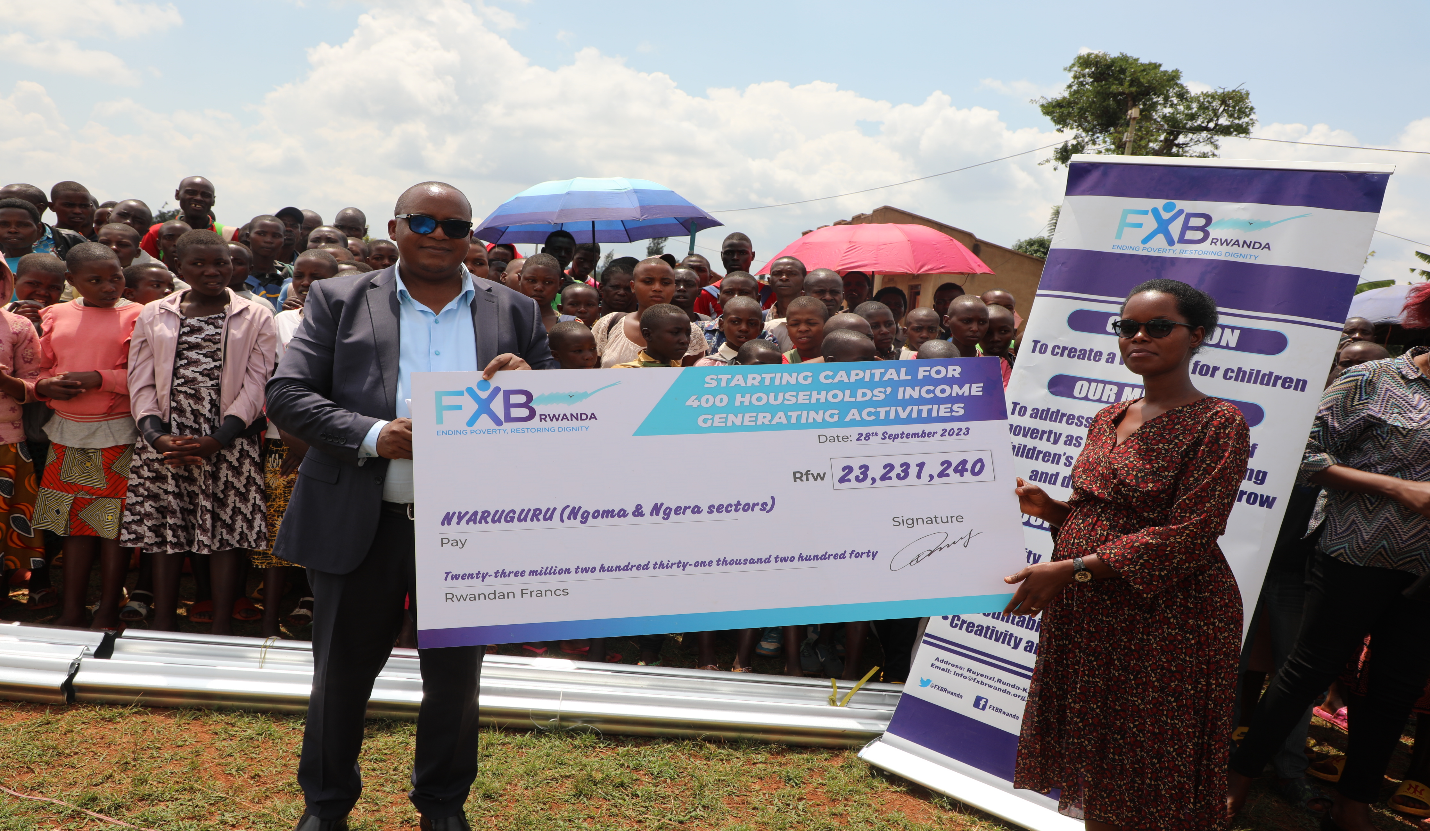To promote innovative community interventions in Early Childhood Development (ECD) and mental health, on 20-23 September 2023, FXB Rwanda through Sugira Muryango program in partnership with the Ministry of Gender and Family Promotion, University of Rwanda Center for Mental Health, Boston College Research Program on Children and Adversity (RPCA), and UNICEF Rwanda conducted the 3rd Regional Research Symposium. Held at Kigali Conference and Exhibition Village with the theme of “Advancing evidence-based interventions for mental health, child development, and parenting”.
The research symposium was aiming to provide a platform for local researchers, practitioners, and international researchers to share their research work and innovative community interventions on mental health and child development. The guest of honor was the Minister of Gender and Family Promotion. In her opening remark, the Minister of Gender and Family Promotion; Valentine Uwamariya called upon all stakeholders to jointly work together to strengthen the capacity of both parents and the family in general to respond to gaps that are still in ECD and mental health services delivery. The Minister highlighted the importance of evidence-based interventions to tackle the problems related to mental health and family strengthening to create a conducive environment for children’s physical and mental development. ‘Let’s commit to investing in interventions that respond to family’s needs….’ She emphasized
During the event, different speakers emphasized the need for scientific-based facts and strong collaboration to join efforts together for handling the family issues that are still hindering children’s full development
The 3-day research symposium was an interactive event which with presentations and open discussions on different topics around ECD and family wellbeing. The inclusive ECD services for Children with disabilities were also pinpointed by presenters and speakers during the symposium.
In developing countries, over 200 million children under 5 years are at risk of stunting, a condition which leads to not fulfilling their development potential and the number could get higher in sub-Saharan Africa where Rwanda is located if nothing is done. Even though the recent Demographic and Health Survey (DHS) showed that stunting and chronic malnutrition in Rwanda dropped to 33 percent, the rates are still highest in the poorest households and those in rural areas. A Household level characteristic (the strength of the family) has been shown to be related to the probability of stunting in children. The highest level of stunting; the many adverse consequences for child survival and long-term well-being.
Prof. Theresa Betancourt Boston College Research Program on Children and Adversity (RPCA) highlighted that the Sugira Muryango Program was designed to respond to the needs of strengthening families to respond to ECD and violence prevention specifically among vulnerable families. She added that it is a time to rely on scientific data to design innovative family-strengthening interventions that support responsive parenting.
Implemented by FXB Rwanda, Sugira Muryango program interventions are well aligned with FXB Rwanda’s vision of ‘creating a world fit for children’.
Sugira Muryango Program has been targeting families in extreme poverty (formerly used social categorization of Ubudehe 1 families in Rwanda) with young children aged 0-36 months to secure their right to survive, grow, and develop.
This program has been iterated since 2011 and the recent iterations include Cluster Randomized Trial (CRT) from 2017 to 2019 and Sugira Muryango expansion phase of 2019 using an implementation science approach designed as PLAY Collaborative strategy to reach families with Evidence-Based ECD interventions utilizing government workforce known as Inshuti Z’ Umuryango.
This 3rd research symposium emphasized the findings from the longitudinal and spillover study which collected data from Cluster Randomized Trial families served under Sugira Muryango after 4 years to check again if they continued to uphold the practices taught and sustained impact of the program over time. The key findings presented are a base of how effective its programming approach is. The parents are still showcasing the continued exercising of the practices that are helpful in Early Childhood Development (ECD) improvement and the program has a spillover effect on younger and older siblings.
The 3rd Regional Research Symposium conveyed researchers, scholars, and practitioners in the field of ECD and mental health from different countries including but not limited to Burundi, Uganda, Kenya, Malawi, Botswana, Sierra Leone, South Africa, Zambia, Vietnam, USA etc.
x
f
x
b
r
w
a
n
d
a
-
Call: +(250) 780 925 908
-
Email: info@fxbrwanda.org






Leave a Comment